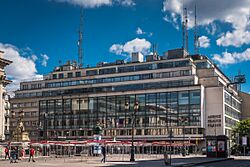Agence France-Presse facts for kids
 |
|

AFP headquarters in Paris
|
|
| Private organization with special status, operating under commercial rules | |
| Industry | News media |
| Founded | 1835 (as Havas) |
| Founder | Charles-Louis Havas (as Havas) |
| Headquarters | Paris, France |
|
Area served
|
Worldwide |
|
Key people
|
Charles-Louis Havas, Jean Marin, Henri Pigeat, Pierre Louette, Emmanuel Hoog |
| Products | Text, photo, video, audio, and graphics |
| Revenue | €321.9 million (2022) €309.5 million (2021) |
|
Number of employees
|
2,400 (2023) |
| Subsidiaries | Sport-Informations-Dienst |
Agence France-Presse (AFP) is a French international news agency. It is based in Paris, France. Founded in 1835 as Havas, it is the world's oldest news agency.
AFP has 2,400 employees from 100 different countries. It has offices in 260 cities across 150 countries. Its main offices are in Nicosia, Hong Kong, Washington, D.C., and Montevideo. AFP shares news stories, videos, photos, and graphics. It publishes them in French, English, Arabic, Portuguese, Spanish, and German. The French government also helps fund AFP. This support helps AFP provide news to everyone.
Contents
History of AFP
Agence France-Presse started as Agence Havas in 1835. Charles-Louis Havas founded it in Paris. This makes it the oldest news service in the world. Havas was one of the first to gather and share news for a fee. By the late 1800s, it was a global company. Two employees from Havas, Paul Julius Reuter and Bernhard Wolff, later started their own news agencies. Reuter started his in London, and Wolff started his in Berlin.
World War II and New Beginnings
In 1940, during World War II, German forces took over France. The news agency was then called "Office français d'information." On August 20, 1944, Allied forces were moving into Paris. A group of journalists from the French Resistance took control of the office. They sent out the first news report from the freed city. They called it Agence France-Presse.
After the war, AFP became a state-owned company. It worked to build its network of reporters around the world. An AFP journalist was the first Western reporter to announce the death of Soviet leader Joseph Stalin in 1953.
Becoming Independent
AFP wanted to be more independent from the government. On January 10, 1957, the French Parliament passed a law. This law made AFP independent. Since then, the money AFP gets from government groups has gone down.
In 1982, AFP started to let its regional offices make more decisions. It opened its first regional center in Hong Kong. Each region now has its own budget and leaders. In 2007, the AFP Foundation was started. It helps improve journalism around the world.
In 1991, AFP worked with Extel to create a financial news service called AFX News. This service was later sold in 2006.
Recent Changes and Challenges
In October 2008, the French government wanted to change AFP's status. This included letting outside investors get involved. Many trade unions in France were against this. They saw it as an attempt to make the agency private.
In November 2013, AFP and Getty Images had to pay money to a photojournalist. They used his photos from the 2010 Haiti earthquake without his permission. This was against copyright rules.
AFP's rules were updated in 2015 to match European laws. The government's funding for AFP changed. It now includes money for public interest missions and commercial subscriptions.
Fabrice Fries is the current CEO and chairman of AFP. Phil Chetwynd is the Global News Director. AFP has been making a profit since 2019. Its debt has also gone down.
In July 2025, AFP announced a serious concern. For the first time, their war reporters were at risk of starvation in the Gaza war. They asked for their journalists to be allowed to leave the area.
Notable Journalists
Many brave journalists have worked for AFP. Here are some of them:
- Christina Assi (born 1995), a photojournalist from Lebanon. She was hurt in October 2023 while covering the Israel-Hamas conflict. In July 2024, she carried the Olympic torch in France. She did this to honor journalists who have died.
- Arman Soldin (1991–2023), a video journalist who was killed in Ukraine.
- Massoud Hossaini (born 1981), won a Pulitzer Prize in 2012.
- Shah Marai (1977–2018), an Afghan photojournalist. He was killed in a bombing attack in Kabul.
- Javier Manzano (born 1975), won a Pulitzer Prize in 2013.
- Ahmad Sardar (1974–2014), an Afghan journalist, killed by the Taliban.
- Paul Guihard (1932–1962), a French editor and journalist. He was killed while covering a riot in Mississippi, USA. His murder is still unsolved.
Awards and Recognitions
AFP has won many awards for its excellent journalism.
- AFP was named "Best News Agency" in 2020 and 2021 by the AIB (Association of International Broadcasters).
- Two photographers won the Pulitzer Prize for an AFP photo. Massoud Hossaini won for his photo of a crying girl after a bombing in Kabul. Javier Manzano won for his photo of Syrian rebel soldiers.
- The World Press Photo of the Year has been given to AFP photographers three times. Hocine Zaourar won in 1998, Ronaldo Schemidt in 2018, and Yasuyoshi Chiba in 2020.
- The Albert Londres Prize has been given to AFP journalists five times. This is a very important award in French journalism.
- Five AFP team members have won the Rory Peck Prize. This award honors freelance journalists.
- The Visa d'Or (News category) has been given to AFP photographers four times.
AFP Services
AFP offers many different services to share news.
AFP Graphics
Since 1988, AFP has had a special department for infographics. These are visual images that show information. This team creates about 70 graphics every day. These graphics cover topics like politics, economics, sports, and general news. They are available in six languages.
AFP Forum
In 2014, AFP launched AFP Forum. This is a platform where you can find all their content. It works on computers, tablets, and phones. You can find news, photos, videos, and graphics. You can also filter news by topic or region. All information is available in six languages, plus Chinese. About 1250 illustrated materials are added every day.
AFP Video Services
AFP started its video services in 2001. In 2007, it launched AFPTV. By 2011, all news videos were in high definition (HD). As of 2015, 200 videos are added daily in seven languages.
In June 2024, Mehdi Lebouachera was named the new Global Editor-in-Chief for AFP. He started this role in November 2024. He has worked as a video journalist and editor in many parts of the world.
Mobile Services
In 2008, AFP launched Mobile services. This is a special digital platform for mobile phones. News is available in six languages. It is divided into many topics like world news, sports, and technology. You can also search by country or city.
How AFP Works
AFP operates under a 1957 law. This law says it must be a commercial business that is independent of the French government.
AFP is led by a CEO and a board of 15 members:
- Eight members are from the French press.
- Two members represent AFP employees.
- Two members are from public radio and television.
- Three members represent the government.
The board chooses the CEO for a three-year term. AFP also has a council. This council makes sure the agency follows its rules. These rules say AFP must be completely independent and neutral.
AFP's Mission
AFP's main goals are:
- To always provide accurate and fair information. It must not be influenced by any political or economic groups.
- To always improve its services. It wants to give French and foreign users exact, fair, and trustworthy news all the time.
- To have a worldwide network of facilities. This helps it be a global news service.
Number of Employees
AFP is based in Paris. It has offices in 151 countries. It has 201 offices and 50 local reporters. It also has five main regional centers:
- Washington (North America)
- Hong Kong (Asia-Pacific)
- Montevideo (Latin America)
- Nicosia (Middle East)
- Paris (Europe and Africa)
As of 2020, AFP had 2,400 employees from 100 different countries. About 1,700 of these are journalists. They provide news in six languages, 24 hours a day.
Investments and Partnerships
AFP has made some important investments:
- AFP GmbH: This is AFP's branch in Germany. It creates German-language news for local media and other clients.
- SID: This is a German-language sports news service.
- Citizenside: In 2007, AFP bought a part of Scooplive. This was a company for citizen journalism photos and videos. Scooplive was renamed Citizenside. However, AFP later sold its shares.
See also
 In Spanish: Agence France-Presse para niños
In Spanish: Agence France-Presse para niños
- List of news agencies
 | Aaron Henry |
 | T. R. M. Howard |
 | Jesse Jackson |

